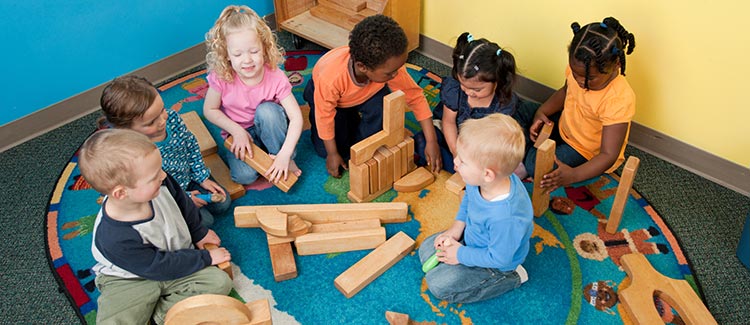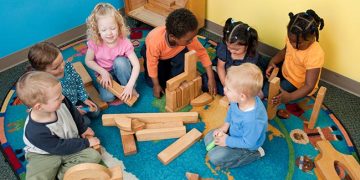Choosing a preschool can feel overwhelming — especially if this will be the first time your little one will spend a substantial amount of time outside of your primary care. Here are 10 questions to ask a preschool to help you evaluate the safety, set-up, and fit of a potential school.
-
Is the school accredited and licensed?
Unlike elementary, middle, and high schools, many preschools are privately run, which presents a risk of less oversight. Many outstanding preschools don’t go through the accreditation process, but if a preschool is accredited by the National Association for the Education of Young Children (NAEYC), which is the most comprehensive and respected national preschool accreditation program, you can be assured it has met the highest standards of safety and education. Check here to find a listing of accredited NAEYC preschools in your area. (Note: Many states exempt religious-based preschools from some or all requirements.)
All private preschools are required to have a license — though depending if it’s a home-based day care or a larger institution, the licensing process can vary. Licensing doesn’t ensure quality, but it does document that the school has met the state’s basic health and safety standards. To find out if the preschool’s license is up to date, ask the school to see it or contact your county or state’s social service department. To learn more about licensing, go to the National Resource Center for Health and Safety in Child Care and Early Education.
-
Are the teachers credentialed?
Requirements for preschool teachers’ training differs from state to state, but ask about the teacher’s training. Did they attend college? Did they study early childhood development? At the very least, the head teacher should be certified in early childhood education and have a B.A. or M.A. Not all staff, like teachers assistants, need to have these formal credentials. Just make sure they are good with kids. Also, ask how long the teachers have worked at the school. High turnover rates can be a red flag for unhappy teachers.
-
Does the preschool meet your family’s needs?
Even if the school is the most popular in your town or city, if it doesn’t meet your family’s basic needs, you may regret your decision. Do the preschool hours work for your work schedule? Is the location convenient for you? Can you afford it? Does the school operate year round? (Summer camps for younger kids can be hard to find, yet many preschools close for the summer.) Finally, does the school provide snacks and a lunch? If they do provide food, make sure you’re comfortable with the school’s nutritional approach.
-
Does the preschool meet your child’s needs?
Children entering preschool have a wide range of maturity. Some are potty-trained, others are not. Some have trouble separating from their parents, while others are independent. Some still take daily naps and some don’t need one. Find out how the school staff deals with all of these basic needs and then decide if the policies will work for your child. Also, take note of the school’s total number of students, average class size, and student-teacher ratio. Ask yourself if these elements fit with your child’s needs.
-
What is the preschool’s educational philosophy?
Many preschools are rooted in a basic educational philosophy, such as Montessori, Reggio Emilia, and Waldorf. (A number of these schools require specific teacher training — such as Waldorf.) Others might offer a faith-based curriculum or function as a parent-run cooperative. The type of school strongly decides how children spend their time and what and how they are taught. Learn more about the different preschool philosophies so you can consider which approach best suits your child’s needs and your own philosophy as a parent.
-
What is the school’s approach to discipline?
Do the teachers respond to difficult behavior (to be expected with preschoolers) in a way that’s in keeping with your parental approach? Ask how teachers respond if a child hits, bites, or kicks. Do they let children work out problems on their own or help facilitate a resolution? Do they use time-outs or other disciplinary techniques? If a child is crying or having a tantrum, how do they respond? If you want more information about how the teachers interact with the children, plan to spend time observing the classroom.
-
Will your child be safe here?
What is the drop-off and pick-up policy? Have them show you the school grounds and explain security to make sure children are properly supervised indoors and outdoors. Also ask how many of the staff are trained in CPR, pediatric first aid, playground safety, and nutrition. Finally, find out their protocol if a child is hurt at school.
-
How much parental involvement do you expect or want?
Because many preschools are privately funded, they may expect parental fund-raising and volunteering. Find out exactly what will be asked of you in terms of financial support or donations. If you are interested in spending time at the school, co-ops are a good choice since they require parents to volunteer in the classroom. If it’s not a co-op, find out if there is an open-door policy so that you can visit when you like.
-
What’s the make-up of the classroom?
Classroom size and number of teachers will determine how much individual attention your preschooler will get. Ask for the teacher-student ratio (or adult-to-student ratio as grown-ups in the classroom can include student teachers, teacher assistants, or, if it’s a co-op, other parents). Also, ask if the school is divided by age (allowing teachers to teach to children at generally the same stage developmentally) or if they have mixed-age groups (so that young kids can learn from older ones and older kids can mentor and nurture younger ones). Finally, if diversity is important to you, take a look at the mix of kids and ask if it’s a priority for the school.
-
How much free play time do the children have?
Some preschools are more academic or structured and have limited free time. Others are more play-based and allow children to choose their activities at will. Decide which best suits your child and your child-rearing philosophy.
Next: Print our free preschool visit checklist for parents





